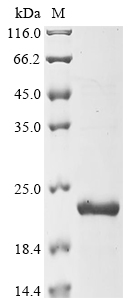Recombinant Raphanus sativus Late embryogenesis abundant protein, partial
CAT:
399-CSB-EP321928RJP-03
Size:
1 mg
Price:
Ask
- Availability: 24/48H Stock Items & 2 to 6 Weeks non Stock Items.
- Dry Ice Shipment: No




Recombinant Raphanus sativus Late embryogenesis abundant protein, partial
- CAS Number: 9000-83-3
- UniProt: P21298
- Expression Region: 1-48aa
- Organism: Raphanus sativus (Radish) (Raphanus raphanistrum var. sativus)
- Target Sequence: MADLKDERGNPIHLTDAYGNPVQLSDEFGNPMHITGVASSAPQYKDSV
- Tag: N-terminal 6xHis-KSI-tagged
- Source: E.coli
- Field of Research: Others
- Assay Type: Developed Protein
- Relevance: LEA protein are late embryogenesis abundant in higher plant seed embryos. There are two subsets of LEA proteins (5a, and 5b), the first ones are expressed when the cotyledon weight reach 80 mg and the second set are expressed above 100 mg. The function of those proteins is not known.
- Purity: Greater than 90% as determined by SDS-PAGE.
- Activity: Not Test
- Length: Partial
- Form: Liquid or Lyophilized powder
- Buffer: If the delivery form is liquid, the default storage buffer is Tris/PBS-based buffer, 5%-50% glycerol. If the delivery form is lyophilized powder, the buffer before lyophilization is Tris/PBS-based buffer, 6% Trehalose, pH 8.0.
- Reconstitution: We recommend that this vial be briefly centrifuged prior to opening to bring the contents to the bottom. Please reconstitute protein in deionized sterile water to a concentration of 0.1-1.0 mg/mL.We recommend to add 5-50% of glycerol (final concentration) and aliquot for long-term storage at -20℃/-80℃. Our default final concentration of glycerol is 50%. Customers could use it as reference.
- Molecular Weight: 20.5 kDa
- References & Citations: "Nucleotide sequence of a radish cDNA clone coding for a late embryogenesis abundant (LEA) protein." Raynal M., Gaubier P., Grellet F., Delseny M. Nucleic Acids Res. 18:6132-6132 (1990)
- Storage Conditions: The shelf life is related to many factors, storage state, buffer ingredients, storage temperature and the stability of the protein itself. Generally, the shelf life of liquid form is 6 months at -20℃/-80℃. The shelf life of lyophilized form is 12 months at -20℃/-80℃.
